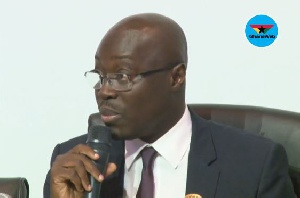The Akufo-Addo government’s expenditure since 2017 “has been directed toward recurrent expenditure (consumption expenditure) to the extent that the key sectors of the economy that would provide sustainable and inclusive growth are being neglected”, the Ranking Member of Parliament’s Finance Committee, Mr Cassiel Ato Forson, has said.
Speaking at a post-budget forum organised by the main opposition National Democratic Congress (NDC) on Wednesday, 20 November 2019, Mr Forson said the “government has spent a greater portion of the Eurobond money on consumption”, adding: “Domestic capital expenditure net of the Annual Budget Funding Amount (ABFA) has seen a downward trend in the last 3 years. This is a very worrying development that must be corrected immediately”.
The Ajumako-Enyan-Essiam MP gave the breakdown of Capex vis-à-vis recurrent expenditure as follows: Capex – 2017 (GHS6,331,410,664); 2018 (GHS4,738,334,834); 2019 (GHS6,034,451,578 – projected); and 2020 (GHS9,260,040,870 – projected), totaling GHS26,364, 237,947.
Recurrent expenditure – 2017 (GHS38,608, 635, 551); 2018 (GHS47,477, 850, 045); 2019 (GHS56,903, 457,990 – 14.3% of GDP); 2020 (GHS66,795,455,335 – 16.8% of GDP), totalling GHS209,785,401,921).
According to him, “Key infrastructure sectors of the economy such as roads, works and housing; and energy are not seeing any improvements in Government resources allocation”.
Mr Forson also said the rate of public debt accumulation is “increasing at an increasing rate while public investment in capital expenditure has reduced over the period”, adding the “government, in the last two-and-a-half years, has, on cumulative basis, added GHS88.3 billion to the public debt and increased domestic capital expenditure by GHS15.6 billion”.
He also noted that statutory funds such as DACF, NHIL, GETfund, Road Fund, and GIIF, established by successive governments to play an important role in infrastructure development, healthcare and local governance, “are being starved of resources”.
“Resources that are supposed to go to these statutory funds”, he said, “Have been capped and the excess diverted to consumption”.
“By end-year 2020, the government would have deducted a total of GHS3.1 billion from GETfund, GHS2.3 billion from Road fund, GHS2.3 billion from NHIL, GHS9.2 billion from DACF, and GHS6.8 billion from GIIF. These deductions which will sum up to GHS23.6 billion by the end of 2020 will go into consumption of goods and services. It is not surprising that road infrastructure has deteriorated badly. NHIA has accumulated so much arrears because of governments own policy”, Mr Forson noted.
“A huge chunk of the expenditure is channelled into consumption (chop-chop) while the key sectors of the economy, such as roads, transport, works and housing; and energy, are starved of the needed resources to be able to sustain the growth. The key sectors are suffering from malnutrition or Kwashiorkor”.
General News of Thursday, 21 November 2019
Source: classfmonline.com













